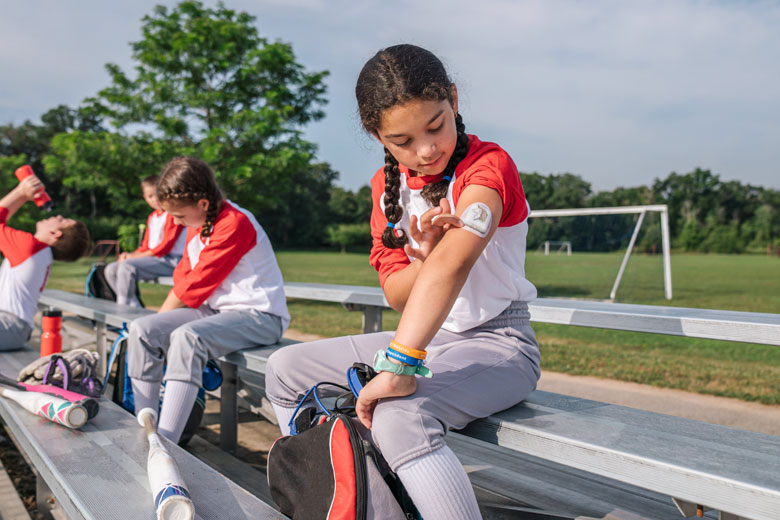Advice for When Your Child Is Sick
People with diabetes have been identified as one group that may face greater risks of complications when dealing with COVID-19. With that in mind, our clinicians have put together a list of guidelines for parents of children with diabetes who may find themselves dealing with any kind of viral symptoms.
When Your Child is Sick What Do You Need to Do Differently?
On days when you or your child are “sick”, glucose levels can either go higher or lower than one might typically expect. High or low glucose levels left untreated can lead to more serious medical problems, so it is important to have a plan. The following are the steps you will want to follow when you or a child is sick.
Any of these conditions below are considered a “sick” day:
| The following may make glucose levels higher: | The following may make glucose levels lower: |
|---|---|
| Common cold | Nausea |
| Flu | Vomiting |
| Infections (such as: ear, throat, urine, chest) | Diarrhea |
| Pain | Decreased appetite |
*If you or your child are on a pump and vomiting occurs, FIRST ASSUME a pump failure. Check glucose and ketones, and refer to the “Trouble Shooting Hyperglycemia with Pump Therapy” handout.
Prevent Ketoacidosis
- Never omit intermediate or long-acting insulin(s) even if you or your child are unable to eat the usual meals. See the Sick Day Management –Insulin handout for guidance on insulin adjustment.
- Monitor glucose levels every 2 to 3 hours, AROUND THE CLOCK
- Monitor for urine or blood ketones every 2 to 3 hours, AROUND THE CLOCK
- Depending on the results of glucose monitoring, give EXTRA Rapid-ACTING insulin every 2 to 3 hours as needed
- Rest and avoid all exercise
Treat the Underlying Illness
Follow the directions of you or your child’s primary healthcare provider when caring for an underlying illness. This might involve administrating antibiotics for an infection, giving Tylenol or other non-aspirin containing medication for a fever, or other medical care. Make certain that the primary healthcare provider caring for the illness knows you or your child has diabetes.
Prevent Dehydration
Preventing dehydration (too much fluid loss as a result of diarrhea, vomiting, or fever) will help keep you or your child more comfortable and is an important part of preventing/managing the development of ketones. The following table outlines the recommended minimum amount of fluid you or your child requires based on weight.
| Weight in Pounds | Ounces per hour (teaspoons per 15 min. interval) |
|---|---|
| Less than 40 | 2 oz. (3 tsp. every 15 minutes) |
| 40 – 120 | 3 oz. (4 - 5 tsp. every 15 minutes) |
| Greater than 120 | 4 oz. (6 tsp. every 15 minutes) |
Fluids should be sugar-free if blood glucose levels are higher than 200 mg/dl, but may contain sugar if the blood glucose is less than 200 mg/dl if you or your child unable to eat. The following table is a guide for determining what type of fluids to give based on glucose levels.
| Blood Glucose Reading | Type of Fluid |
|---|---|
| Less than 100 mg/dl | Sugar-containing |
| 100 – 200 mg/dl | Rotate sugar-free with sugar-containing |
| Greater than 200 mg/dl | Sugar-free |
Select what you or your child prefers from the following list. Follow the above guide to determine whether or not to use sugar-free fluids:
- Carbonated beverages (sugar-free and regular)
- Crystal Light or Kool-Aid
- Tea
- Water
- Jell-O
Clear liquids, such as Jell-O, soda, Gatorade, Pedialyte, and apple juice may be easier to tolerate than creamier items when your child is feeling sick to the stomach.
Pediatric Rehydration Solutions are also available at supermarkets and drug stores. They can be used to help replenish salt and other electrolytes that have been lost by vomiting or diarrhea. They contain some carbohydrate so please read the label carefully. Listed below are a few examples:
- Enfalyte (Mead Johnson) 6 oz. = 22 calories, 5.5 grams carbohydrate
- Pedialyte (Ross) 8 Fluid oz. = 24 calories, 6 grams carbohydrate
- Pedialyte Freezer Pops (Ross) 1 each (2.1 fl.oz.) = 6 calories, 1.5 grams carbohydrate
- Pedialyte Powder Packs (Ross) 1 pack (8.5 g) mixed with 8 fluid oz. water = 23 calories, 5.8 grams carbohydrate
Contact your Diabetes Care Team Caring for you or your child’s IMMEDIATELY if any of the symptoms listed below develop:
- Positive ketones in the urine or blood (regardless of glucose levels), and/or ketones not responding to treatment
- High or low glucose levels not responding to treatment
- Inability to drink or keep down the recommended amount of fluid
- Vomiting that persists for one hour or longer
- Signs of dehydration such as decreased urination, dry mouth, cracked lips, sunken eyes, skin that is flushed and dry, and weight loss
- Signs of ketoacidosis such as nausea, stomach pain, vomiting, chest pain, rapid shallow breathing, or difficulty staying awake
Diabetes Care Team Contact Information:
Business hours (Monday – Friday 8:30 am to 5:00 pm) call 617-732-2603.
Night, weekends, and holidays call 617-309-2400 and ask for the pediatrician on call.
Although this content is reviewed by Joslin Diabetes Center healthcare professionals, it is not intended to replace the medical advice of your doctor or healthcare provider. Please consult your healthcare provider for advice about a specific medical condition.




